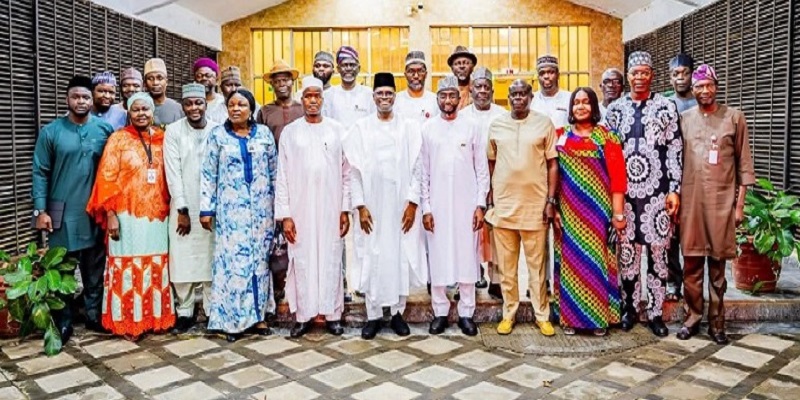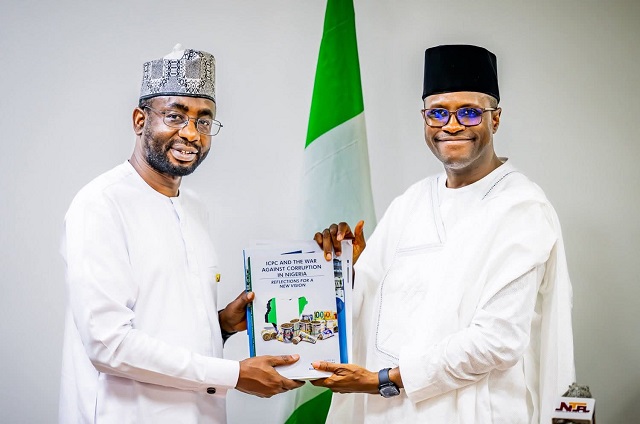In a decisive move to curb corruption in public sector technology initiatives, the National Information Technology Development Agency (NITDA) and the Independent Corrupt Practices and Other Related Offences Commission (ICPC) have established a Joint Task Force on Digital Governance and Anti-Corruption.
The collaboration according to a release jointly signed by Mrs. Hadiza Umar, Director, Corporate Communications & Media Relations Department at NITDA and Dr [Mrs] Anike Adeshina, Head, Media and Publicity at ICPC, aims to mitigate corruption risks in government IT projects, enforce the IT Project Clearance mandate, and ensure that digital transformation truly becomes a tool for transparency, efficiency, and service delivery across public institutions.
The announcement was made during a high-level courtesy visit by the Director General of NITDA to the ICPC Headquarters in Abuja, where both agencies reaffirmed their shared commitment to President Bola Ahmed Tinubu’s Renewed Hope Agenda, particularly his vision of building a $1 trillion digital economy anchored on integrity, innovation, and ease of doing business.
Over the past two decades, billions of naira have been lost to failed or abandoned government IT projects. Many Federal Public Institutions (FPIs) have procured digital solutions without obtaining mandatory clearance from NITDA, resulting in duplicated efforts, inflated costs, poor technical standards, and in numerous cases, complete project failure.
Some of these projects, individually worth billions, have either failed to deliver value to citizens or been abandoned midstream. Others have degenerated into avenues for corruption through practices such as contract splitting, use of unregistered vendors, and the deliberate evasion of due process.
This troubling pattern has not only led to massive financial waste but has also undermined public confidence in government’s ability to deploy technology for transparency, accountability, and cost-effective governance.
The NITDA IT Project Clearance process was instituted to eliminate such inefficiencies and risks by ensuring that every government IT initiative is properly evaluated, aligned with national ICT standards, interoperable, and capable of delivering value for money.
Despite this, compliance remains a major challenge, as some government agencies and contractors attempt to bypass the process. The ICPC has now identified such non-compliance as a corruption risk that requires strict enforcement—hence the creation of the Joint Task Force.
Digital TimesNG understands that the new collaborative framework between NITDA and ICPC is expected to strengthen oversight, close loopholes, and promote digital governance practices that uphold integrity and accountability across the public sector.

The Joint Task Force will serve as an enforcement mechanism, combining NITDA’s technical oversight role with ICPC’s investigative and prosecutorial powers. Its mandate will include:
- Enforcement of IT Clearance: Ensuring all FPIs obtain mandatory IT Project Clearance before embarking on technology projects, with ICPC providing enforcement where violations occur;
- Monitoring and Sanctioning: Jointly monitoring IT projects and sanctioning defaulting FPIs, in accordance with extant regulations; and,
- Integration of Enforcement Tools: Embedding NITDA’s monitoring instruments into ICPC frameworks such as the System Study & Review, the Ethics & Integrity Scorecard, and other anti-corruption tools to institutionalize compliance.
The Director General of NITDA, Kashifu Inuwa Abdullahi, stressed the importance of IT Project Clearance as a national safeguard, designed to track Government spending in IT, ensure synergy in national investments in IT and prevent development of projects in silos where significant resources can be shared by FPIs.
“The IT clearance regulation is designed to ensure that IT projects are properly conceptualized and executed in line with global best practices, ensuring value-for-money investments, reducing duplication, and creating a unified digital government,” Inuwa said.
The ICPC Chairman, Dr. Musa Adamu Aliyu, SAN, welcomed the collaboration, noting that corruption in IT procurement undermines both public trust and economic progress, and emphasized ICPC’s readiness to use its statutory powers to support NITDA’s mandate and hold both contractors and public officials accountable.
Both leaders agreed that the Joint Task Force will serve as a model of inter-agency collaboration, ensuring that digital transformation in government is free of corruption, efficient, aligned with Nigeria’s development goals and global best practices.
The establishment of the Joint Task Force represents a decisive step toward addressing systemic corruption risks in government IT projects as the initiative will ensure that Nigeria’s digital transformation efforts deliver real value to citizens and support the President’s vision of a modern, transparent, and competitive economy.

